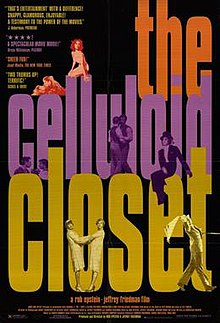The Celluloid Closet
| The Celluloid Closet | |
|---|---|

Movie poster for The Celluloid Closet.
|
|
| Directed by |
Rob Epstein Jeffrey Friedman |
| Produced by | Rob Epstein Jeffrey Friedman Howard Rosenman (executive producer) |
| Written by |
Vito Russo Rob Epstein Jeffrey Friedman Sharon Wood Armistead Maupin |
| Starring | See below |
| Narrated by | Lily Tomlin |
| Music by | Carter Burwell |
|
Production
company |
|
| Distributed by | Sony Pictures Classics |
|
Release date
|
|
|
Running time
|
107 minutes |
| Country | United States |
| Language | English |
| Box office | $1,400,591 |
The Celluloid Closet is a 1995 American documentary film directed and written by Rob Epstein and Jeffrey Friedman. The film is based on Vito Russo's book of the same name first published in 1981 and on lecture and film clip presentations he gave in 1972–82. Russo had researched the history of how motion pictures, especially Hollywood films, had portrayed gay, lesbian, bisexual and transgender characters.
The film was given a limited release in select theatres, including the Castro Theatre in San Francisco, in April 1996, and then shown on cable channel HBO.
The documentary interviews various men and women connected to the Hollywood industry to comment on various film clips and their own personal experiences with the treatment of LGBT characters in film. From the sissy characters, to the censorship of the Hollywood Production Code, the coded gay characters and cruel stereotypes to the changes made in the early 1990s.
Vito Russo wanted his book to be transformed into a documentary film and helped out on the project until he died in 1990. Some critics of the documentary noted that it was less political than the book and ended on a more positive note. However, Russo had wanted the documentary to be entertaining and to reflect the positive changes that had occurred up to 1990.
Russo approached Epstein about making a film version of The Celluloid Closet and even wrote a proposal for the film version in 1986. But it wasn’t until Russo died in 1990 that Epstein and Friedman gained any traction on the project. After his death, Channel 4 in England approached the filmmakers about the film, and offered development funding in order to write a treatment, “and most importantly to determine if it would even be possible to obtain the film clips from studios.”
...
Wikipedia
